

Human Nature. Mentoring the next generation - a challenge to the SA creative industry. There is no doubt that South Africa's advertising industry is already present on the world stage. Job Descriptions and the "Experience-Needed" Syndrome - Tammy Johns. Globally, one in three employers struggle to find employees with the skills and experience necessary to meet their needs, and almost one-third cite a lack of experience as a key barrier to filling their open jobs.

Despite the serious shortage of some skills, the disconnect between employers and job seekers is not surprising given how many job descriptions fall victim to the “experience-needed syndrome.” This ailment manifests itself in two ways. In one, job descriptions for entry-level positions ask for experience, which shuts out many young workers. Scott Gerber - Young Entrepreneur, Media Personality, Author, Speaker & Founder of YEC. Why Social Marketing Is So Hard - Nilofer Merchant. The Right Entry Point for Emerging Markets - Scott Anthony. East Meets West: Who Has Better Leaders? - Scott Edinger. Why Some Ads Go Viral and Others Don't - Video. How Employers Can Help Solve the Skills Gap - David Smith. It's Harder than Ever to Be a Senior Executive - Boris Groysberg.
The Market that Needs a Market Maker - Tammy Johns. By Tammy Johns | 10:07 AM February 16, 2012 Do you wonder why there were an average of 8 million jobs posted online in the U.S. every month of last year, while 13 million people continued to search for work during the exact same months?
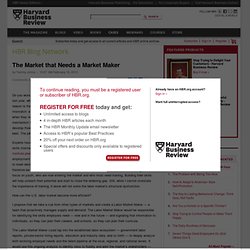
The reason is that the U.S. — along with just about every other country — is suffering from a talent mismatch: employers cannot find individuals with the skills and capabilities they need, where and when they need them. The problem is not just one of location and timing, however. There is no mechanism that reliably signals which skills employers need so that individuals and schools can develop those skills. In other words, the relationship between supply and demand is tenuous at best. Experts have examined the problem from every angle and concluded that, if left unresolved, the skills mismatch will continue to eat away at U.S. competiveness. How can the U.S. labor market become more efficient? The New Path To the C-Suite. The Idea in Brief.
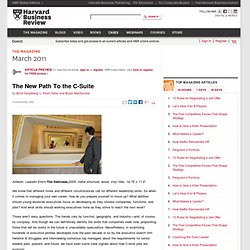
Managing Yourself: Making It Overseas. When Alan, a rising star at a U.S.
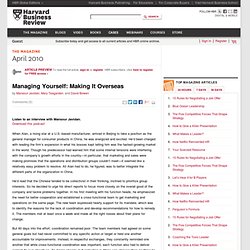
-based manufacturer, arrived in Beijing to take a position as the general manager for consumer products in China, he was energized and excited. He’d been charged with leading the firm’s expansion in what his bosses kept telling him was the fastest-growing market in the world. Though his predecessor had warned him that some internal tensions were interfering with the company’s growth efforts in the country—in particular, that marketing and sales were making promises that the operations and distribution groups couldn’t meet—it seemed like a relatively easy problem to resolve. All Alan had to do, he figured, was to better integrate the different parts of the organization in China. He’d read that the Chinese tended to be collectivist in their thinking, inclined to prioritize group interests. Insight Center: The Next Generation of Global Leaders - Sponsored by Accenture. S 10 Must Reads on Managing Yourself (with bonus article "How Will You Measure Your Life?" by Clayton M. Christensen)
Why We Use Social Media in Our Personal Lives — But Not for Work - Tammy Erickson. By Tammy Erickson | 12:05 PM February 16, 2012 “We’ve spent a fortune on collaborative technology, but no one is using it … or if they are, it’s for purely social, non-productive activities.”
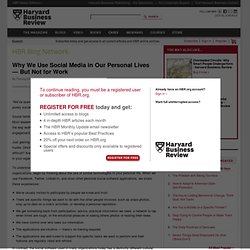
Sound familiar? It’s a lament I’ve heard many times from organizations over the past several years. Most leaders are sold on the tremendous potential new collaborative technologies present to change the way work gets done: increasing productivity, stimulating innovation, and enhancing employee engagement. Is the Next Karl Marx a Management Consultant? - Justin Fox. By Justin Fox | 2:30 PM January 25, 2012.
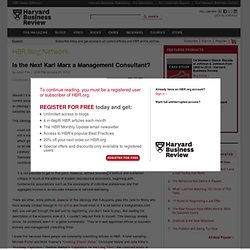
How to Innovate When You're Not the Big Boss - John Beeson. By John Beeson | 11:20 AM February 15, 2012 A few years ago, Brad Anderson, then CEO of Best Buy, told me something both provocative and profound.

We were discussing what he looked for in selecting someone for a C-suite level role. Among other skills, he wanted to find executives who had the wisdom to know when the organization needed to be fundamentally changed and shaken up — and when the organization needed time to incorporate prior changes. Understanding Female Talent in Emerging BRIC Markets - Sylvia Ann Hewlett. Privilege: A User's Guide - Gianpiero Petriglieri - HBS Faculty. By Gianpiero Petriglieri | 10:41 AM January 25, 2012.

Prepare for an Interview by Thinking Like an Employer - Bill Barnett. By Bill Barnett | 2:39 PM January 26, 2012 People have different natural talents at interviewing for jobs.

But even the most talented can fail to get offers if they don’t prepare. The Best Global Leaders are Local Leaders - Ndubuisi Ekekwe. By Ndubuisi Ekekwe | 8:36 AM January 25, 2012 A few years ago, Thomas Friedman eloquently said that “the world is flat.”
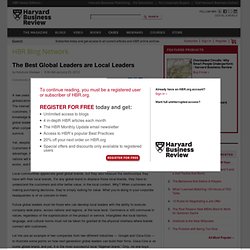
Technology and globalization have made commerce a far more level playing field than it was many decades ago. The internet has unlocked opportunities, giving businesses access to previously unreachable customers. There’s a sense of equal opportunity in markets, with geographical and historical knowledge becoming more and more irrelevant. From business schools to boardrooms, building global leaders has been identified as a crucial factor for organizational growth.
Yet, despite increasing interdependence across the globe, the world is not necessarily flat. Local communities appreciate great global brands, but they also treasure the relationships they have with their local brands. Future global leaders must be those who can develop local leaders with the ability to execute company-wide plans, across nations and regions, at the local level. An Introvert's Guide to Networking - Lisa Petrilli. By Lisa Petrilli | 9:15 AM January 25, 2012 I learned the critical importance of networking, and discovered my natural aversion to it, early in my career. Develop Leaders the Montessori Way - Ambiga Dhiraj. By Ambiga Dhiraj | 11:39 AM January 25, 2012 When it comes to employee development, most companies traditionally follow the 10/80/10 rule: The top 10 percent are promoted, the middle 80 percent are nurtured and the bottom 10 percent are let go.